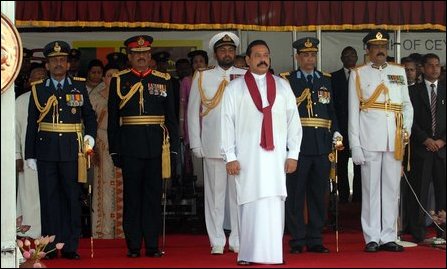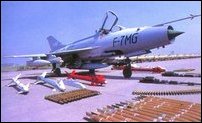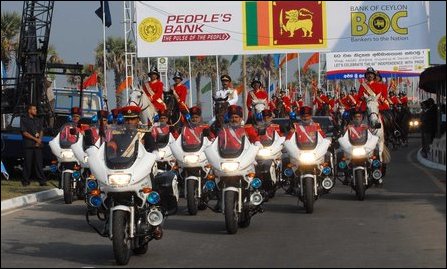
'Hatching chicken from spoiled egg'
[TamilNet, Tuesday, 05 February 2008, 04:15 GMT]
Ruling out any constitutional reform and upholding a 'single unitary state', the Sri Lankan President Mahinda Rajapaksa in his 60th Independence Day speech harped on 'bringing the provincial administration closer to the people within the framework of the constitution' to resolve the ethnic crisis of Sri Lanka. “The solution must be based on what could be implemented in this country. We cannot offer solutions that are experiments,” he said. The challenge he stressed was the 'defeat of terrorism'. “Impotent of laying new eggs, the president is duping Tamils, promising to hatch an egg rotten for 60-years,” said Selvam Adaikkalanathan, Member of Parliament and the leader of TELO.

Mahinda Rajapaksa, the president and Commander-in-Chief of the Sri Lankan Armed Forces, with his commanders at Independance Day celebrations.
Mr. Mahinda Rajapaksa, in his address cited the contributions of pre-independence Tamil and Muslim leaders Handy Perinpanayagam who first called for full independence of Ceylon, Ponnampalam Ramanathan and Dr. T.B. Jayah and said that all communities of Sri Lanka participated in the freedom struggle, but none didn't want a divided country.
In another part of his speech, the president resolved to continue to defend the 'majority opinion' of the people of the country.

Selvam Adaikkalanathan [Library Photo]
Responding to the speech of Rajapaksa, Mr. Selvam Adaikkalanthan, said that the democratic norm of the rule of political majority was always misunderstood as the permanent rule of Sinhala majority in Sri Lanka. The misinterpretation of democracy and nationalism, in independent Sri Lanka, left no option to the Tamil political leadership other than leading them to the Vaddukkoaddai declaration of 1976, calling for the sovereign state of Thamizh Eezham, which was overwhelmingly endorsed by the franchise of the Tamil electorates of North and East in 1977, well before the rise of Tamil militancy.
A noticeable feature of Rajapaksa's address was the nuances behind the listing of his foreign supporters. While assured of the support of the western countries, he was talking of 'new relations established with neighbouring states, Arab states and Buddhist states'. “Our neighbouring states trust us. Our problems and issues are also problems and issues of our neighbouring states,” he said.
It is very well known that tacit support to Sri Lankan government in the ongoing war against Tamil aspirations mainly comes from India in the region. However, the collective term "neighbouring states," and the phrase "new relations established" are considered by analysts as references to newly found military aid from Pakistan and Iran.
Camouflaged in the term 'Buddhist states' comes the reference to China, which is currently the active provider of military hardware to Sri Lanka.

The F-7 aircraft is the widely produced Chinese version of the MiG-21. It is also known as J-7 (Jianjiji-7) [Photo courtesy: www.fas.org]
Eyewitnesses report the secret arrival of six fighter aircraft to Katunayaka airbase last week to strengthen the squadrons of the Sri Lanka Air Force. "The much talked of Chinese built F-7 interceptor jets have now been procured and will soon be put to use," reported the political editor's column of the Sri Lankan weekly, The Sunday Times, in its latest edition.
Towards the conclusion of the ceremony, Rajapaksa hoisted the Sri Lankan flag on a mast of 100-feet height, using a remote control device, both gifted by Sri Lankans residing in China.
According to analysts in Colombo, a general lure laid for all foreign countries in the speech of Rajapaksa, were the offshore oil of Mannaar and the ocean resources of Sri Lanka, once the LTTE is defeated.
While the president was jubilantly claiming the 'liberation of the East' and ensuring a 'difficult victory', an atmosphere of fear prevailed in the South and in the Sri Lanka Army controlled areas of North and East. Very few vehicles plied the streets of the capital Colombo. Authorities declared the closure of schools within the Municipal limits of Colombo for a week. People avoided going out and it was almost like a
Hartal day.
Anti aircraft guns and naval patrolling were parts of the security arrangements for the Independence Day functions held at Galle Face. SMS messaging of mobile phones was blocked for six hours from 6:00 a.m. till noon.
Meanwhile, Claymore attacks in Ampaa'rai and Ma'nalaa'ru, claimed the lives of SLA soldiers and civilians.
In Jaffna, the traders were ordered and forced by the SLA to hoist the Sri Lankan flag in their business establishments. As flags were not available in Jaffna, the traders went for paper flags and pasted them like posters. Unidentified men threatened the news paper offices in Jaffna to hoist the flags. Streets were empty as people largely remained indoors. Unlike the previous years, the SLA in Jaffna didn't show much enthusiasm either for celebrating the day or for hoisting the flags in their camps.

Motorbike parade by Sri Lanka Army soldiers at Sri Lanka's 60th Independence Day.
05.02.08
SL President Mahinda Rajapaksa's address on Sri Lanka's 60th.. 22.05.03
Colombo’s new proposals said not valid in law 08.06.97
Vaddukkoaddai Resolution










